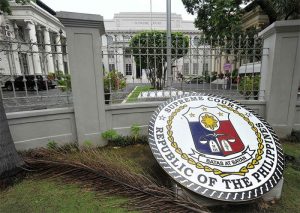
PDRCI Deputy Sec. Gen. Francisco Pabilla, Jr. (second from left) receives the Certificate of Recognition from Atty. Jewel Bulos (leftmost), University Secretary and Associate Dean, UMAK School of Law; Makati City Mayor Abigail Binay (center), Makati City Vice Mayor Monique Lagdameo, and Ms. Aurora Serrano, UMAK Vice President for Administration and Finance.
UMAK awards Certificate of Recognition to PDRCI
The University of Makati (UMAK) awarded PDRCI a Certificate of Recognition during itsRecognition Day for Industry Partners held on November 27, 2018. An annual event organizedby UMAK, the Recognition Day is part of UMAK’s Industry Partners Program founded on the principle that education must be closely linked with the realities and needs of the industrieswhere its graduates end up working with their industry partners. UMAK and PDRCI had signed in October 2017 a Memorandum of Agreement (MOA) formalizing this partnership. The Certificate of Recognition was given to Mr. Francisco D. Pabilla, Jr., PDRCI Assistant Secretary General, by Makati Mayor Abigail Binay and Vice-Mayor Monique Lagdameo, and Atty. Jewel Bulos, University Secretary, as an expression of UMAK’s gratitude for PDRCI’s close ties with UMAK’s School of Law under the Deanship of former Vice President Jejomar Binay who is a PDRCI-trained arbitrator.
WHAT’S INSIDE
- UMAK Awards Certificate of Recognition of PDRCI
- Part 1: The Philippines’ pro-arbitration policy: A step forward gone too far?
By Jay Santiago & Nusayha Muti - Member Spotlight: Atty. Angel Chona Grace Ilagan Valero-Nunez
The Philippines’ pro-arbitration policy:
A step forward gone too far?
By Jay Santiago & Nusaybah Muti
On the 60th year of the signing of the Convention on the Recognition and Enforcement of Foreign Arbitral Awards (“New York Convention”), the Philippines Supreme Court, declared for the first time its adoption of a narrow definition of “public policy” under Article V(2)(b) of the New York Convention.1
In Mabuhay Holdings Corporation v. Sembcorp Logistics Limited, G.R. No. 212734, Dec. 5, 2018, the Supreme Court held that “[m] ere errors in the interpretation of the law or factual findings would not suf fice to warrant refusal of enforcement under the public policy ground. The illegality or immorality of the award must reach a certain threshold such that, enforcement of the same would be against [the Philippines’] fundamental tenets of justice
and morality, or it would blatantly be injurious to the public, or the interests of the society.”
The ruling is a welcome development that certainly supports the Philippines’ new pro-enforcement policy. In particular, the declaration of a narrow definition of “public policy” under Article V(2)(b) of the New York Convention is crucial in establishing the country as a pro-enforcement seat for foreign arbitral awards.
The other pronouncements in the decision, however, raise questions on the Supreme Court’s (arguably) “pro-enforcement” interpretation of Articles V(1)(c)2 and (d) of the New York Convention. One could ask: is this a case where the Supreme Court had “gone too far” in its pro-enforcement approach?
This article analyses the Supreme Court’s reasoning in Mabuhay and attempts to highlight its potential implications in practice.
Case summary
 In 1996, Sembcorp Logistics Limited (“Sembcorp”), a Singaporean company, and two Philippine corporations, Mabuhay Holdings Corporation (“MHC”) and Infrastructure Development & Holdings, Inc. (“IDHI”) (collectively, the “Philippine Corporations”), entered into a Shareholders’ Agreement (the “Agreement”).
In 1996, Sembcorp Logistics Limited (“Sembcorp”), a Singaporean company, and two Philippine corporations, Mabuhay Holdings Corporation (“MHC”) and Infrastructure Development & Holdings, Inc. (“IDHI”) (collectively, the “Philippine Corporations”), entered into a Shareholders’ Agreement (the “Agreement”).
Under the Agreement, the Philippine Corporations guaranteed that Sembcorp would receive a minimum accounting return (the “Guaranteed Return”) in exchange for Sembcorp’s investment in Water Jet Shipping Corporation, a Philippine corporation engaged in the venture of carrying passengers on a common carriage byinter-island fast ferry, and Water Jet Netherlands Antilles N.V., a Curacaoan (then Antillean) company.
The arbitration clause in the Agreement states:
“19.1 This Agreement and the validity and performance thereof shall be governed by the laws of the Republic of the Philippines.
19.2 Any dispute, controversy or claim arising out of or relating to this Agreement, or a breach thereof, other than intra-corporate controversies, shall be finally settled by arbitration in accordance with the rules of conciliation within the terms of the submission to arbitration. According to MHC, the dispute referred to arbitration was an intra-corporate controversy, a dispute expressly excluded from the scope of thearbitration clause;
Article V(1)(d) of the New York Convention, i.e., the composition of the arbitral authority was not in accordance with the parties’ agreement. According to MHC, the appointment of the sole arbitrator, a Thai national, was not in accordance with the arbitration clause (which requires “expertise in the matter at issue”) as he does not have expertise in Philippine law, the governing law of the Agreement; 5 and
 Article V(2)(b) of the New York Convention, i.e., the recognition or enforcement of the award would be contrary to the public policy of the country where recognition or enforcement is sought. According to MHC, the arbitral award contains findings that violate Philippine laws on partnership and interest rates.
Article V(2)(b) of the New York Convention, i.e., the recognition or enforcement of the award would be contrary to the public policy of the country where recognition or enforcement is sought. According to MHC, the arbitral award contains findings that violate Philippine laws on partnership and interest rates.
The trial court refused the enforcement of the Final Award. On appeal, the Court of Appeals reversed the trial court’s ruling and ordered the enforcement of the Final Award. In upholding the Court of Appeal’s ruling, the Supreme Court made the following pronouncements:
- Under the kompetenz-kompetenz principle in Rules 2.2 and 2.4 of the Special Alternative Dispute Resolution Rules (“Special ADR Rules”), 7 an arbitral tribunal may initially rule on its jurisdiction. Under Rule 13.11, “[i]n resolving the petition for recognition and enforcement of a foreign arbitral award … the court shall … not disturb the arbitral tribunal’s determination of facts and/or interpretation of law.” As the sole arbitrator had determined that the dispute was not an
intra-corporate dispute, the courts shall not disturb such determination. In any event, “[e]ven granting that the court 8 may rule on the issue of whether the dispute is an intra-corporate controversy,” MHC failed to submit any sufficientevidence to the contrary. - As MHC previously challenged the sole arbitrator under the 1998 ICC Rules, and the ICC Court decided to reject the challenge, the court shall no longer “entertain any challenge to the appointment of arbitrator disguised as a ground for
refusing enforcement of an award.” In any event, “[i]f the intent of the parties is to exclude foreign arbitrators due to the substantive law of the contract, they could have specified the same considering that the ICC Rules provide for appointment of a sole arbitrator whose nationality is other than those of the parties.” - The alleged violations of Philippine law under the Final Award are not sufficient to constitute as violations of the Philippines’ public policy for purposes of enforcement of a foreign arbitral award under the New York Convention. In any event, the findings in the Final Award did not violate any Philippine law.
